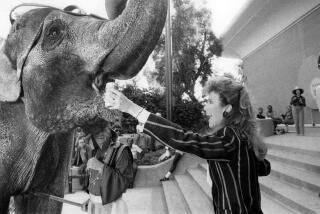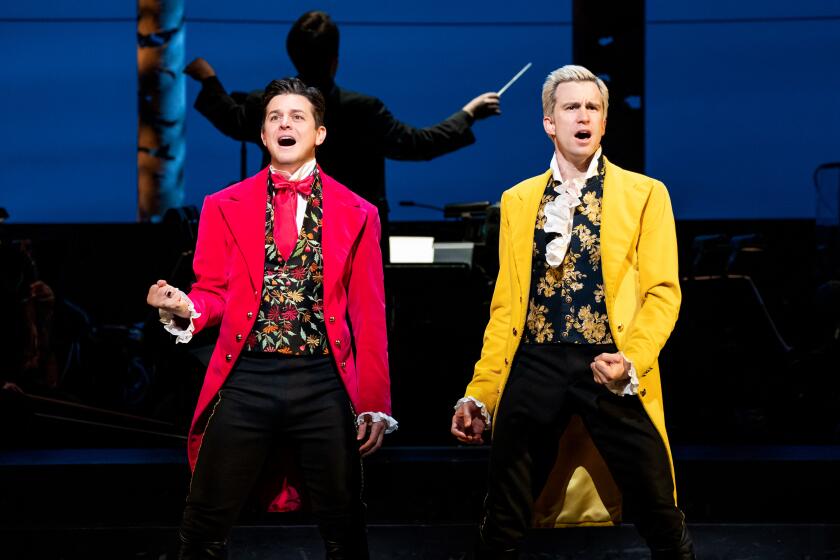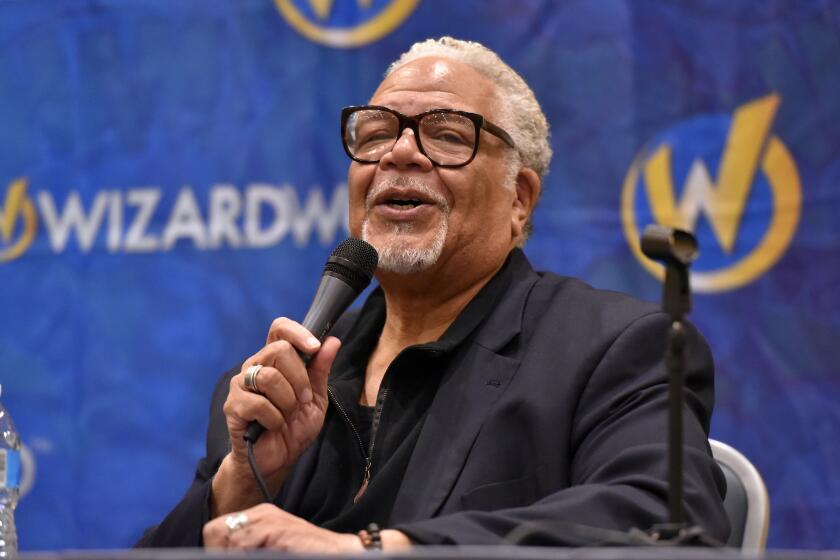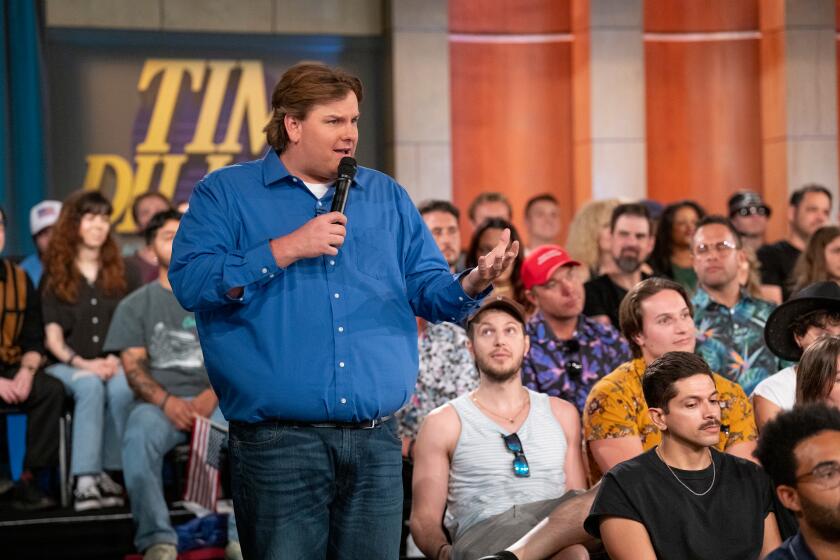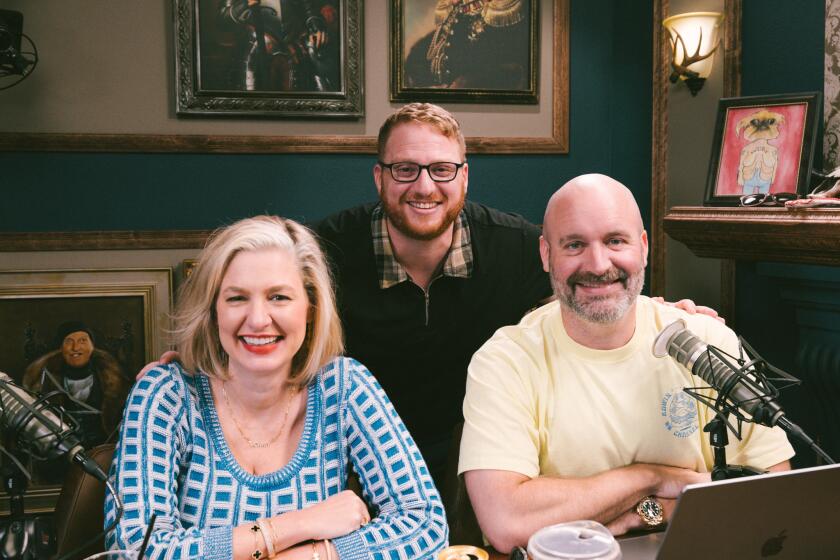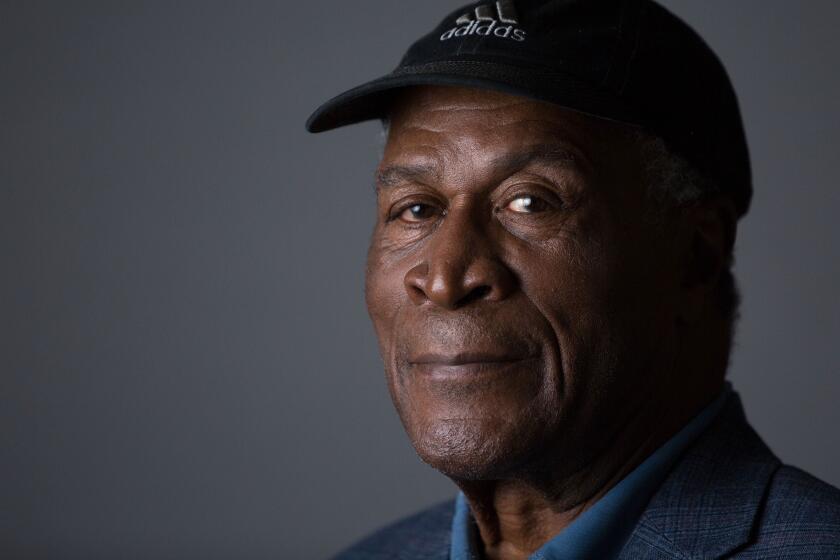Reinventing the Black Panthers : Activism: A new coalition is dedicated to community work but without violent rhetoric. Founders hope L.A. will be a launching pad for renewed movement.
There are no shotguns here. Huey Newton’s menacing stare and Afro are buried somewhere deep in the Oakland Hills. Bobby Seale’s cool, calm looks and Elaine Brown’s piercing eyes are just a memory. Dashikis are still in fashion, but for the most part the black leather jackets and tilted berets have been replaced with tight-fitting baseball caps and baggy blue jeans.
This is the Black Panther Party of the ‘90s, or the New African American Vanguard Movement, a coalition of ex-Panthers who, along with a new batch of eager young black kids of the ‘80s, have come together to reinvent Black America’s most radically flamboyant group of a quarter-century past.
Still dedicated to community activism but without the rhetoric of violent self-defense, the group is using a smoldering Los Angeles as a backdrop for what it hopes will become a national movement again. Members believe that Los Angeles, after the last few years of turmoil and racial introspection, may be the perfect launching pad for a new generation of Panthers.
“If L.A. rocks, then the whole nation can rock,” said Shareef Abdullah, an organizer of the group who worked with the Panthers in Los Angeles from 1975 to 1980 and believes the city was the “strongest and most capable chapter in the Black Panther Party.”
The Panther revival effort--like previous, unsuccessful efforts elsewhere in the nation since the Panthers disbanded in 1981--seems likely to raise a political question that still divides historians: Who were the Panthers? Were they gun-toting opportunists posing as a community movement, whose clashes with police resulted in the deaths of 28 party members and 14 law enforcement officers in the late 1960s and ‘70s? Or were they a revolutionary attempt by African Americans to control their neighborhoods, with feeding programs as well as guns--an effort so threatening to the Establishment that the FBI launched a program to destroy them?
This dichotomy flared earlier this month when, after much controversy, the city Cultural Affairs Commission approved a city-funded mural, titled “To Protect and Serve,” that pays tribute to the Panthers.
The New African American Vanguard Movement’s first formal event, a grocery giveaway and festival, will be Saturday afternoon at the Vision Complex Theatre in the Crenshaw district’s Leimert Park.
Members said the day will highlight the Panthers’ contributions to black life in the past, such as free breakfast programs, escorts for the elderly and alternative schools.
“When you use the words Black Panther Party, people conjure up so many bad images, they don’t understand exactly what the Panthers were about,” said Kizzy Brown, an organizer of the coalition and mother of two teen-age boys.
Abdullah and other founders of the new group said the foundation the Panthers built can be used to politically organize African Americans from all backgrounds. They want to work closely with Latino and Asian community groups as well as reach out to disaffected youths such as gang members.
“We are not trying to reinvent the wheel,” organizer B. Kwaku Duren said. “The NAAVM will simply try to unify existing organizations.”
The Black Panther Party was begun in Oakland in 1967 by Huey Newton and Bobby Seale, at the peak of an era in which blacks rebelled against established political and social organizations. While the movement ended in a wave of bitterness and recriminations, leaders like Newton and Seale have become icons in recent years, with at least five Panther-related films in development and increased curiosity among young people.
The new group’s organizers have been planning their program for more than a year. Whether their efforts will eventually do what the Panthers did for black politicians in Oakland--set up a greater political power base for people like Rep. Ron Dellums (D-Oakland) and former Oakland Mayor Lionel Wilson--can’t yet be gauged. But group members say they realize it will take more than merely an assembly of new activists using a familiar name to bring together African Americans in Los Angeles.
“We are learning in L.A. that just as other communities are coming together, so must we,” Brown said.
The group’s eight-point program, patterned after the Panthers’ original mission statement, contains many of the same messages about police brutality, fighting hunger and providing medical care for inner-city residents. But there are some differences.
For example, for most Americans the image of the Panthers is often one of brandishing weapons and clashes with police. While group organizers say self-defense “should always be a priority for African Americans,” they will try to downplay violence.
“The emphasis will not be on guns,” Abdullah said. “That alienated some black folks; we don’t want to repeat that.”
“Policing the police,” a confrontational tactic that the Panthers became nationally known for, will not be an immediate goal, Abdullah said. Nevertheless, he said the group will monitor the Los Angeles police.
The fact that the new organizing attempt features Panther veterans with knowledge of the party’s struggles--from the death of Fred Hampton in Chicago at the hands of the FBI to Newton’s bout with drugs--is what attracted 23-year-old Michael Allen.
Allen, a senior at UC Irvine, is in charge of recruiting students and other youngsters. A native of Los Angeles, he grew up with images of the Panthers at home.
“I remember when I was a kid and my mother telling me she was heading to Panther meetings in Watts,” Allen said.
Bringing his generation of young African Americans, which is often dismissed as apathetic and unfocused, into the group will be imperative to its success, Allen said.
Many say the crucial elements that split up the Panthers were dissension among members coupled with harassment from the FBI and its Counter Intelligence Program, or COINTELPRO, which targeted what it labeled “black hate groups.”
The new Panthers said they are aware of what it will take to keep this effort free from distractions. “We’ve learned from the past. We won’t make those same mistakes again,” Kizzy Brown said. “Especially in turning against ourselves.”
Former Black Panther Ericka Huggins, who worked in the founding Oakland chapter from nearly its inception until its end, said she supports the new effort but hopes organizers are honest with themselves. Huggins, whose husband, John, was gunned down on the UCLA campus in 1969 in a struggle over who would control the university’s black studies program, said people who want to lead must first “look deep within themselves and deal with their own personalized oppression.”
More to Read
The biggest entertainment stories
Get our big stories about Hollywood, film, television, music, arts, culture and more right in your inbox as soon as they publish.
You may occasionally receive promotional content from the Los Angeles Times.


